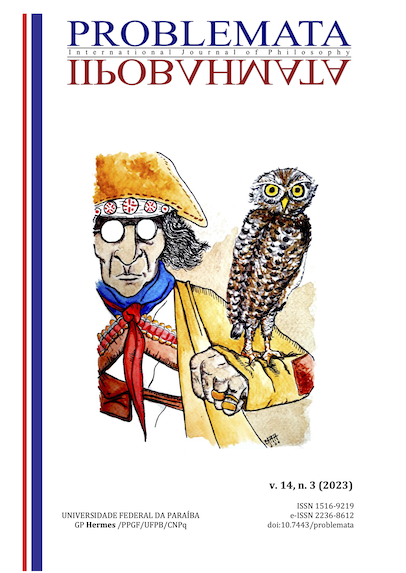ASPECTS OF HUMAN NATURE:
COMMENTS ABOUT THE HUMAN BEING AND ITS CONDITION
DOI:
https://doi.org/10.7443/problemata.v14i3.67530Keywords:
Human nature, Human condition, Tolerance, Capitalism, FreedomAbstract
This article analyzes aspects of human nature and its condition, based on the philosophical arguments by Baruch Spinoza, who demonstrates that the human being must leave imaginative knowledge and evolve to knowledge of the second and third kind, where these teach us to distinguish the true from the false, empowering our life in existence, in other words, knowing the aspects through causes (essence) and not through the effect (imagination). Beyond the arguments by Erich Fromm, whose thinking is based on the vision of the human in capitalist society and their mental health, and by Karl R. Popper, in his philosophy of mind and in his exposition of the paradox of tolerance, following the chronological order of these philosophers, starting from modern philosophy to contemporary philosophy. Therefore, for that purpose, this work was built from a bibliographic research, that has the characteristic of analyzing and building new paradigms based on theses that have already been worked on diligently. Based on this, it was concluded that only autonomy achieved through knowledge enables freedom and only social agreements constructed by individuals guided by moral responsibility can guarantee its maintenance.
Downloads
References
CHAUÍ, Marilena de Souza. Espinosa: uma filosofia da liberdade. São Paulo: Moderna, 1995.
COSTA, Célio Juvenal. Reflexões sobre a relação indivíduo x civilização na sociedade atual. Cadernos de Pesquisas em educação, Espírito Santo, n. 38, p.11-34, jul.-dez., 2013.
ESPINOSA, Baruch de. Breve tratado de Deus, do homem e de seu bem-estar. Tradução de Emanuel Angelo da Rocha Fragoso e Luis Cesar Guimarães Oliva. São Paulo: Autêntica, 2012.
FROMM, Erich. Psicanálise da sociedade contemporânea, 7. ed. Rio de Janeiro: ZAHAR, 1974.
KANT, Immanuel. Fundamentos da metafísica dos costumes. Trad. Lourival de Queiroz Henkel. São Paulo: Ediouro, 1997.
MAGEE, Bryan. Popper. Barcelona: Ediciones Grijalbo, 1974.
POPPER, Karl Raimund; ECCLES, John. The Self and its brain. Berlin, Heidelberg: Springer International, 1977.
POPPER, Karl Raimund. A sociedade aberta e seus inimigos. Belo Horizonte: Ed. Itatiaia; São Paulo: Ed. da Universidade de São Paulo, 1974.
SPINOZA, Benedictus de. Ética. Tradução de Tomaz Tadeu. Belo Horizonte: Autêntica Editora, 2009.
TEIXEIRA, Livio. A doutrina dos modos de percepção e o conceito de abstração na filosofia de Espinosa. São Paulo: Editora UNESP, 2001.
Downloads
Published
Issue
Section
License
Copyright (c) 2023 Rogério Tolfo

This work is licensed under a Creative Commons Attribution 4.0 International License.
Authors who publish with this journal agree to the following terms:
- Authors retain copyright and grant the journal right of first publication with the work simultaneously licensed under a Creative Commons Attribution License that allows others to share the work with an acknowledgement of the work's authorship and initial publication in this journal.
- Authors are able to enter into separate, additional contractual arrangements for the non-exclusive distribution of the journal's published version of the work (e.g., post it to an institutional repository or publish it in a book), with an acknowledgement of its initial publication in this journal.
-
- Authors are permitted and encouraged to post their work online (e.g., in institutional repositories or on their website) prior to and during the submission process, as it can lead to productive exchanges, as well as earlier and greater citation of published work (See The Effect of Open Access).





